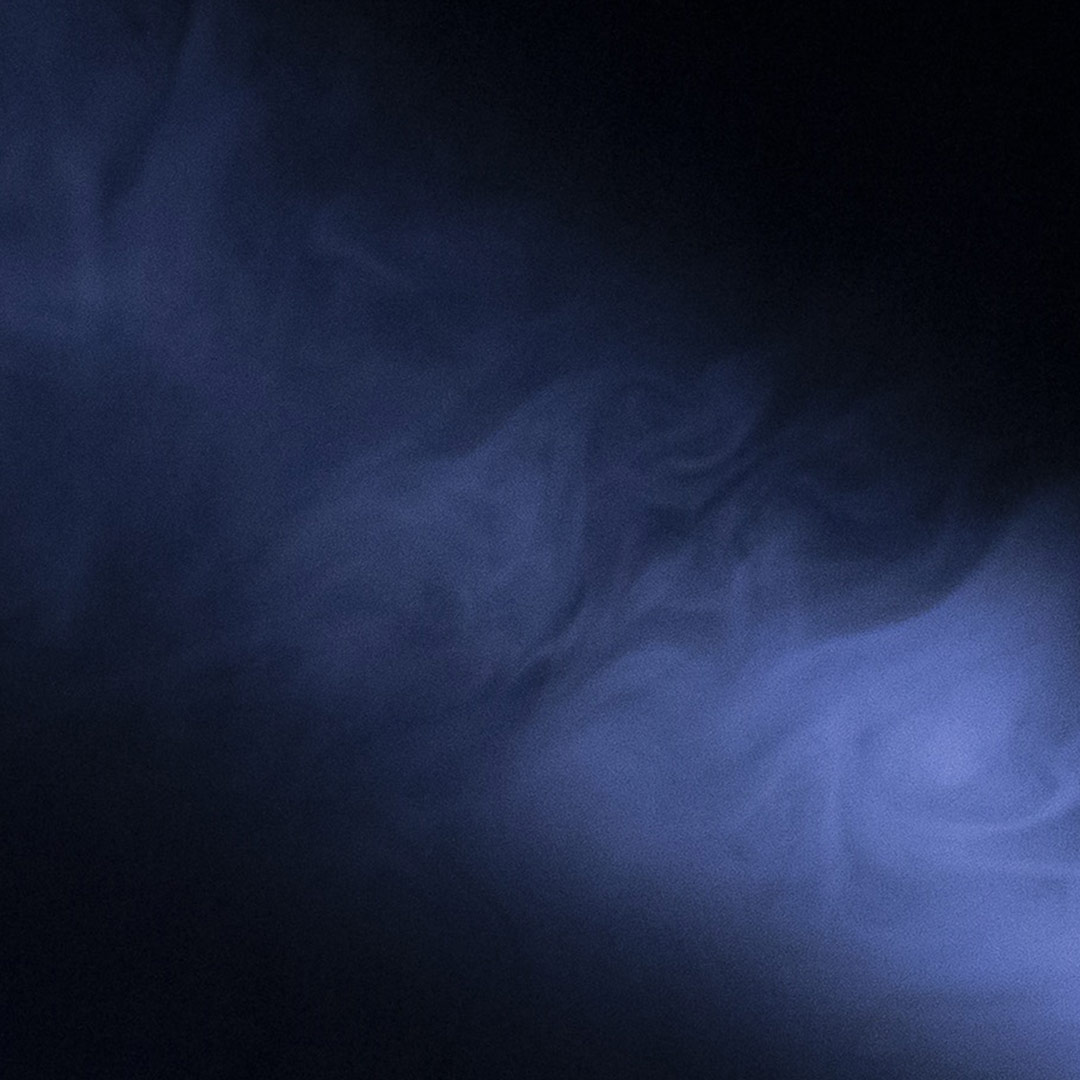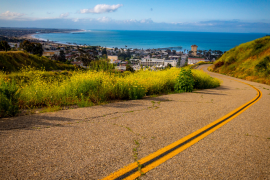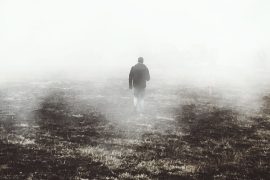PAUL KEEPS JENNY’S ASHES IN A GREEN METAL THERMOS that he carries with him wherever he goes. This morning Paul put on his good suit and got on a bus headed north out of Pittsburgh. Through the window, the landscape looks dull and faded. Trailer parks. Perkins. Slippery Rock. Conneaut. He is headed to a small lakefront town where there’s a woman named Sue who can help him. Sue came highly recommended by Erin.
Erin works in the cubicle by the coffee pot and vending machines. She carpools to work with Paul. They’ve been dating for several months and take smoke breaks together.
“I didn’t believe in this stuff either,” Erin told Paul last winter, “but I kept getting brutal headaches after Mike died. Vivid nightmares about the murder. Cold sweats. The works. I was up late and saw her special on TV. Figured what the heck?”
Paul shared similar symptoms. “Did she help?”
“With some things.” Erin gave him a worn business card with Sue spelled out in purple ink. The embossed lettering eased Paul’s skepticism.
Paul uses the edge of the card to clean dirt from his nails as the bus rolls into the station. To the north is the lake, and he thinks he can see Canada on the far shore. Or is it Michigan? Across the highway stands a Coors billboard. An icy train exploding through a guitar.
When Paul steps off the bus he’s nearly blindsided by a yellow dog that races out into traffic and nearly causes an accident. The crowd filing out of the station is so thick he feels he might be swarmed under. Paul asks a passing woman for a cigarette. She says no and whips away a match that floats onto the concrete with a wet hiss.
Paul is three miles from town when he starts walking. He breaks a sweat as the sun starts sinking. Shivers rip through him. Rain clouds gather overhead. The thermos rests in his suit pocket and bumps off his hip with each step. Loafers pinch his feet. Dressing up for such an occasion seems ridiculous. Why didn’t he wear sneakers? From now on, Paul decides, he will only wear sneakers. Once this business is over he will throw his dress shoes in the lake. Maybe the whole suit which he hasn’t worn since the funeral and reminds him of family court.
It’s dark when Paul stops at a dive called Tommy’s on the edge of town. Beer signs buzz into the eyes of a stuffed 12-point frozen mid-leap by the door, and the air smells like stale cigarettes and livestock. The thermos wobbles when he sets it on the bar. He orders a Coke for himself and gets Jenny a shot and a beer because she was that type of girl when they met. Paul arranges the drinks in front of the thermos and spins around on his stool. Game of pool in the corner. Tickets in the window. Jukebox full of Patsy Cline. When he stops spinning, the bartender is way down by the poker machines and there’s a woman beside him. One of her eyes is noticeably bigger than the other.
Since Jenny’s death, this happens often to Paul. Women approach him. He attributes it to his regimen. Back home, he puts the thermos on the shelf in the basement and Jenny watches him work out on the Soloflex he pulled off the curb. At the office, during lunch, he holds the thermos and jogs around the building then packs her into his briefcase before heading back to his cube.
When the girl with the one big eye says hello, Paul envisions dirty hotel room sex, possibly for money, while Jenny sits on top of the TV, watching them. The room will feature a painting of the sunset over the lake. Shores of Canada in the distance.
“You got coffee in that thing?” the girl asks. “I’d love a cup. I’m freezing.” She could pass for sixteen or thirty. Oversized sunglasses rest on dyed blond hair. Her skirt covers little, but her shoes are so practical. Between her last two fingers, the girl bends a red straw and chews on the end.
“My wife’s in there,” Paul says, though he and Jenny never married.
“Those drinks hers?”
Paul pushes the booze towards the girl. “You like whiskey?”
“Enough to drink it.” The girl tongues the straw to the edge of her mouth, swallows half the whiskey. “You ever been homeless?” she asks.
“Excuse me?”
“You wouldn’t think so, but the days are hardest. Because when I was homeless, I knew I could at least sleep in my ex’s van in his parents’ driveway or one of the abandoned houses across town. During the day, I didn’t know what to do to keep busy. How do you fill all that time?” The girl rubs the pink lipstick stain she left on the glass. “You’re not from around here.”
Paul pulls the card from his pocket and taps it on the bar. “I’m in town to see Sue.”
“She’s a scam artist.”
“I heard different.”
The girl swipes away the card and flicks it at the jukebox. “Well, she lets me park behind her place sometimes. On Truman Circle. You’ll need help finding it. I’ll show you.”
“I don’t need help.”
The girl twists the strap of her shirt, finishes the shot. “That’s not how I see it.”
Paul drags his thumb through the condensation on the outside of his glass. The jukebox starts to skip, and the girl walks over and unplugs it. Conversation in the bar dies. She plugs it back in and sits back down. Everyone’s talking again.
“I’m leaving.” Paul gulps down his Coke. “Nice meeting you.”
“Don’t you want company? I’m going that way anyhow.”
“I don’t have any money,” Paul says.
“I’m not asking for any.”
The girl leaves with her full glass of beer. Paul follows. The yellow dog is sitting out on the sidewalk, panting. For several blocks they walk in silence, nothing but footfalls and darkness. The girl leads Paul through the park then down an alley that dead-ends behind a restaurant and smells like dumpster grease and weed. Two cooks pass a joint beneath a mural of the town’s former mayor. Smoke gathers in front of the politician’s painted eyes. Paul loosens his belt and stuffs the thermos down his pants.
“For someone going to see a fake psychic, you look awful serious,” the girl says. “You need to get over yourself. I had polio when I was little, legs were crooked till junior high. And I had operations, was in a wheelchair some.” The girl drains her beer and throws the glass against the dumpster where it shatters and frightens away the dog. “Kids are mean,” she says. “But look, my legs are pretty great now.” She does a little half-turn and shows them off.
“You must have a regimen.”
“Weirdo.”
They cut through the kitchen and across the half-empty dining room. The girl grabs an envelope from the bartender and introduces Paul as Cousin Tom in town for the weekend. Paul can’t remember the girl’s name, and there is no way to ask for it now without embarrassing them both. The girl says, “Why don’t you wait outside while I freshen up some.”
Out front Paul bums a cigarette off a busboy. A plastic cup flips in the wind under a streetlight. Paul tries to wiggle his toes. When the girl comes outside, she gives the busboy a kiss and takes Paul’s hand.
“You work there?” Paul asks.
“Something like that.”
A few more turns, past a statue of a cannon, and they hit Truman Circle just as it starts raining. Paul can see the theater at the end of the block. The marquee reads Uptown Cinema: This Place is Special! Below this message, a list of movies from Paul’s childhood. Missing red letters in the titles. Ripped posters on brick. Windows boarded up.
“Here it is,” says the girl. “I’m parked around back. I can ride you wherever, after.”
“Thanks.” Paul pulls the thermos from his pants. He has no idea how to get back to the restaurant or the bar or the bus station.
The girl thumbs her shirt strap. “Let me come with,” she asks.
“You said she’s a fake.”
“So.”
“So, I’d rather you not come with.”
It starts raining harder. Paul rubs the dent in the thermos.
“Your eyes,” he says. “You’re fucked up.”
“I’m trying not to be.”
He gives the girl his jacket.
She backs against the ticket window. “I’ll be here.”
Fluorescent arrows lead Paul upstairs to the projection booth where Sue sits in a lawn chair surrounded by film canisters. Unspooled reels drip from racks. Walls gashed for their copper wire. Ribbons of smoke twist in the candlelight.
“I was wondering when you’d show.” Her voice is metal on glass. “Have a seat.” She’s wearing black sweatpants and a 7-11 cashier’s shirt with Sue on the nametag.
Paul hands Sue a post-dated, fifty dollar check and sits across from her on a yellow ottoman, gripping the thermos. “I can see Jenny,” he says. “Feel her with me. She won’t let me sleep. I have a daughter I don’t know what to do with. My girlfriend is going to leave me.”
“Look, hon.” Sue lights a cigarette off a candle, offers Paul the pack of Misty 100s. “I can help, but you need to relax one.” She blows smoke at the ceiling in a long stream made thick by cold breath. “Hon, you need dirt. Soil. I always say, ‘ashes need dirt.’ That’s one thing I know.”
The projector clicks on. Music from an 80’s car chase. Synthesizer echoes around them.
“What are you talking about?” Paul pulls a Misty from the pack. “You’re a fraud, aren’t you? I should have known.” He dips his head towards a candle, watching Sue while he lights his cigarette.
“Hon, I’m as real as you need me to be.” Sue takes the thermos from his fist and sits it on the table between them, then turns his hand over in hers and runs a finger down his palm. “Have you accepted Jesus Christ as your personal Lord and Savior?”
“What? You’re upsetting Jenny. Me and Jesus are fine.”
“But have you walked with the Lord?” Sue closes her eyes.
“Listen to me.” Paul yanks his hand away. “What do I do about Jenny? You’re not listening.”
Sue bats her cigarette over a coffee can. “Find a garden,” she says. “Plant the ashes.”
“Where?”
“Christ, hon, use your imagination.”
“What do I do until then?” Paul stares over the candle at Sue. Nicotine-stained hair. Mustard smear on her shirt. Pin in the shape of a Slurpee crooked above the name tag.
“Tell me your story, hon. You need someone who will listen, I can see that.” She reaches across the table for his trembling hand as if to steady it.
***
Outside the rain has stopped. The girl sits shivering with the dog in her lap. “Come stay by the lake,” she says. “Just for the night. I don’t have many friends.”
“I can’t pay you.”
The girl’s face goes dark. She jumps up and sends the dog howling down the empty street. “I don’t want your fucking money.” She pushes Paul, and her sunglasses fall from her head and rattle on the sidewalk. “Quit treating me like a whore.”
“I don’t do well with junkies.”
“I’m trying to help. Helping others is how you get clean.”
“So I’ve heard.”
“Let me then.”
The girl pulls at the hem of her skirt and picks up her glasses. “You really got your dead wife in there?”
Paul twists open the thermos, dips in a finger and wipes that much ash on the girl’s breastbone. The girl covers the spot with her hand and stands there in the rain for a moment before pulling the jacket tight across her shoulders. They walk behind the building where her car is waiting.
***
The cabin sits right on the lake. Inside it smells damp and lemony. All the furniture is covered in plastic, and it feels like someone either just left or is sitting in the next room. The dog sleeps by the fireplace.
The girl tosses Paul’s jacket on a rocking chair that sways and creaks under the weight. She straightens a stack of TV Guides on the counter and joins Paul in the kitchen. “Tell me about your daughter.”
“She sings a lot,” he says.
“I like to sing.”
Paul rests the thermos on the windowsill above the sink and pulls back the curtains. Next to the porch there’s a boxed-in section of yard full of rocks and leaves. Rotting twine wrapped around tomato stakes, jumping in the wind.
“We can play something later.” The girl nods at a stack of board games on the coffee table.
“Sure.” Paul takes off his belt and hangs it over the faucet.
The girl says, “Why don’t you make us some drinks while I change.”
He finds a plastic Toronto Maple Leafs cup and a rocks glass in the cupboard. The freezer rattles when he opens it, but the bottle is icy. His fingers stick to it. He pours her a vodka tonic. Straight tonic for himself. Pictures hang on the walls. Paul can’t find the girl in any of them, but he doesn’t look too close.
She comes out of the back bedroom wearing jeans and a threadbare red sweater. Paul picks his jacket up off the chair and follows her through the broken screen door. The girl carries her drink in front of her with both hands. Ice cubes clink as they step towards the edge of the deck and sit cross-legged, kneecap to kneecap.
Bugs jump in the mist. Moonlight spreads across the lake. Paul slides off one shoe and then the other.
“Is that Canada?”
“I think so.”
The girl leans in close. She puts her glass against his cheek. It feels cold.
Ben Gwin is the author of Clean Time: The True Story of Ronald Reagan Middleton (Burrow Press, 2018). His work has appeared or is forthcoming in The Rumpus, 45th Parallel, The Normal School, and others. He lives in Pittsburgh with his daughter.
Like what you’re reading? Get new stories sent to your inbox every Monday.
Drop your email below to start >>>




